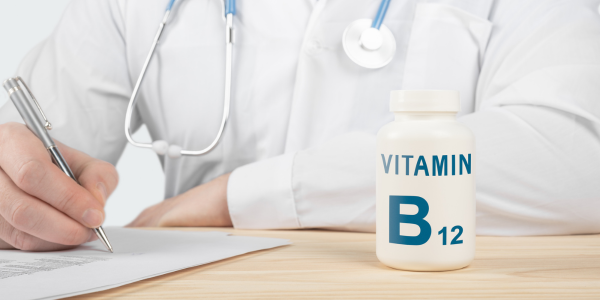Vitamin B12, also known as cobalamin, is an essential nutrient required by the body for many functions, from physical to psychological. It is a nutrient that our body cannot produce, therefore it is important to get adequate intake from diet or supplementation.
B12 deficiency has been shown in 1 in 20 people below the age of 75, with the risk doubling in those over 751.
We hear about B12 deficiency being a relatively common nutrient deficiency, however, less is known about the sheer breadth of health benefits associated with this vital vitamin and why maintaining our levels is so important.
B12 Health Benefits
B12 boosts our health in various ways2:
- It is vital for healthy nervous system function, helping to support healthy nerve cells
- Required for red blood cell formation (along with iron and folate) and is needed to help red blood cells develop properly
- An important nutrient to help with DNA synthesis
- Needed for healthy foetal brain and nervous system development during pregnancy
- Helps to support bone health and reduce fracture risk
- May help to improve mood by metabolising serotonin, our ‘happy hormone’.
- Along with other b vitamins, can help boost energy
What are some of the common warning signs of B12 Deficiency?
Vitamin B12 deficiency can cause a wide range of health symptoms which usually develop gradually over weeks and months, with symptom severity increasing if it goes untreated (NHS Inform 2023) 3
Fatigue and tiredness are common symptoms of B12 deficiency as it is required for energy and red blood cell production. A lack of this nutrient can develop into megaloblastic anaemia, in which red blood cells are large, abnormally shaped and unable to move from bone marrow into our bloodstream efficiently4.
The lack of red blood cells reaching our bodies tissues will mean a lack of oxygen being carried around the body which leads to fatigue. People commonly report breathlessness and feeling faint as common symptoms.
Hair loss is a notable complaint amongst those who are B12 deficient. Several micronutrients are required for healthy hair growth, including B12. If gastrointestinal function, for example, is impaired than the body cannot absorb a range of nutrients, in particular B12 which requires stomach acid to be absorbed. This can result in hair loss as B12 is needed as part of the hair follicle cycle, playing a role in hair cell turnover5.
A symptom of early B12 deficiency is glossitis, which is a red and painful inflamed tongue. This can also accompany a dry mouth and cracked lips. These symptoms also appear with B2 (riboflavin), B3 (Niacin) and folate deficiency, therefore if you’re experiencing these symptoms, it is best to speak to your health practitioner for further testing6.
Paraesthesia (burning/numb hands and feet) is also another common sign in both adults and children. As B12 supports healthy nerve cell function, deficiency in this nutrient leads to tingling and numbness in extremities. Muscle cramps and weakness are another common complaint associated with the deficiency due to motor and sensory dysfunction. Again, if you are experiencing these symptoms please do speak to your GP and seek further testing.
Depression is another common symptom experienced with this deficiency. Low levels of this nutrient can lead to high levels of amino acid homocysteine, which is inflammatory to the body. This can also lead to DNA damage and other mental health conditions including issues with concentration and mental impairment.
What groups are most at risk of deficiency?
Unfortunately, those on a plant-based diet are at a very high risk of B12 deficiency as this nutrient can only be obtained in adequate dietary amount in animal-based foods. It is thought that even lacto-ovo-vegetarians may run the risk of deficiency as dietary rich sources of B12 include red meat and fish7.
Women of menstruating age, and especially those with heavier or prolonged periods are at increased risk of B12 deficiency. B12 is used, as mentioned, in the formation of red blood cells which are partly lost through menses. If our period is particularly heavy or lengthy, we will lose more B12 (along with folate and Iron) and have a higher requirement for these nutrients.
Pregnant women are also at higher risk of multiple nutrient deficiencies including B12 as more nutrients are required to support foetal growth and development. B12 is especially important for foetal nervous system and red blood cell development and maturity.
Those who are managing diabetes with metformin are also at risk of B12 deficiency, as the medication lowers serum b12 levels in the body by blocking B12 absorption8.
Those with gastrointestinal disturbances such as IBS and coeliac should be especially careful, as mentioned, healthy gut function and ample stomach acid is required to absorb B12. It is notably common for people in this risk group to also be iron deficient due to poor absorption therefore increasing the chances of anaemia9. B12 deficiency increases with age, with over 60% of those aged 60 and over at risk of deficiency, as stomach acid naturally declines with age. If you are in the age group most at risk, do focus on supplementing with natural digestive aids such as apple cider vinegar to help increase stomach acidity.
For anyone in a high-risk group, I would strongly advise to consider supplementation to ensure healthy levels of this essential nutrient.

Vitamin B12
What's the latest guidance?
Given how detrimental B12 deficiency can be on health, NICE has published the first ever draft guidelines on B12 deficiency as of July 2023.
Recommendations included in the draft are10:
- If two or more common signs or symptoms and a risk factor is present (such as age, GI surgery or autoimmune conditions) then a blood test to check B12 levels should be offered.
- Treatment including supplementation should be discussed if B12 deficiency is suspected, with or without testing.
- GPs should offer dietary and supplemental advice to help patients top up their B12 levels.
The draft guideline aims to increase awareness of B12 deficiency and tackle it in early stages for healthier outcomes.
What makes nutrient deficiencies so confusing is that symptoms can mask other deficiencies, or one nutrient deficiency signs and symptoms can mimic another. For example, iron deficiency has many overlapping symptoms with B12 deficiency, therefore making testing a great option to gain clarity and choose the right supplementation.
If you are concerned that you may have a B12 deficiency, then do speak with your health practitioner who will be able to, if appropriate, carry out a blood test to check your B12 status.





















